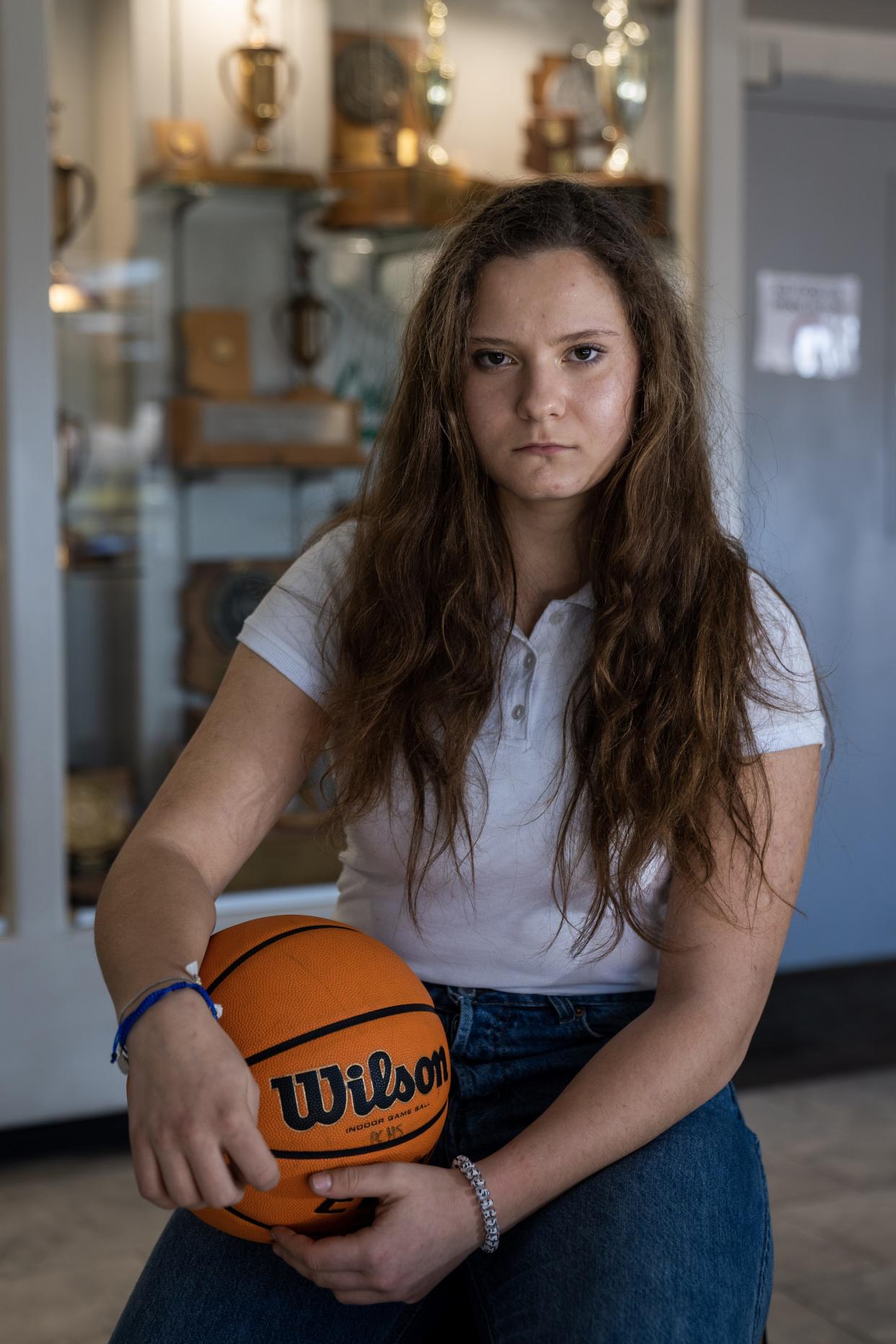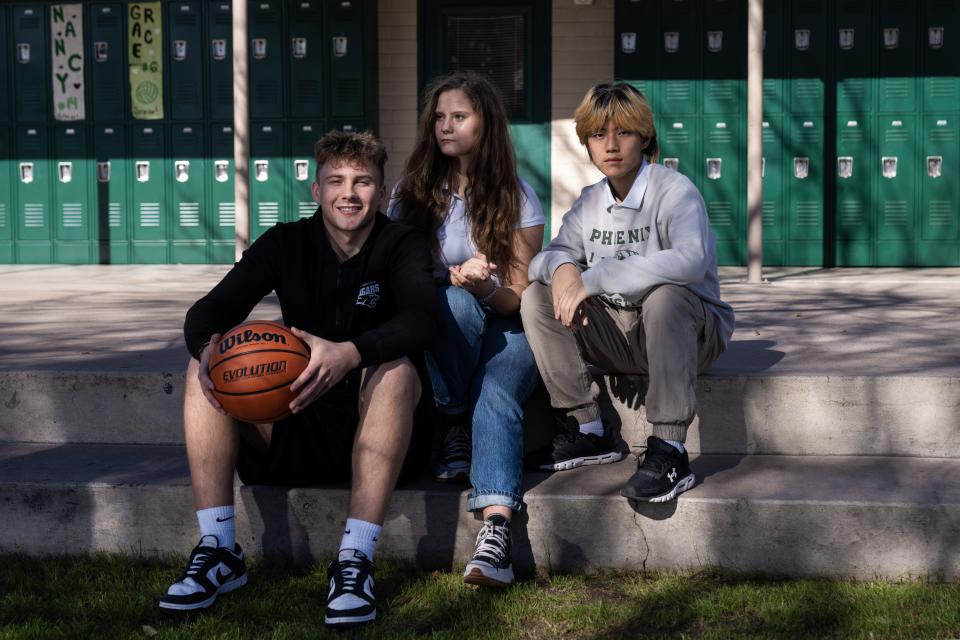Arizona HS basketball player, who fled war in Ukraine, can't play varsity under AIA rule

Sasha Danyliuk isn't a ringer brought to Phoenix Christian to lead the girls' basketball team to a state title.
She fled the war in her homeland Ukraine a year ago, coming to Phoenix Christian, hoping for a better life and the promise of tomorrow. A freshman, she wishes to graduate in 2026 from the small private school that competes in the Arizona Interscholastic Association.
But because of an international eligibility rule ushered into the AIA bylaws in 2011, after tiny Orme School, a boarding school outside of Mayer, went 25-0 and won the 1A boys basketball state title with mostly international players, she can't ever play in a varsity game. She's good enough to be playing varsity, but she is playing junior varsity.
She did not come here with a J-1 visa that falls under the Council on Standards for International Educational Travel (CSIET), a foreign-exchange program that the AIA recognizes. But even with that, it is good for only one year of academic and varsity eligibility as a foreign-exchange student.
Like others at Phoenix Christian not allowed the privilege to play varsity sports, she came to the school on an F-1 Visa (Academic Student). That allows a person to come to the United States as a full-time student and stay as long as they wish, as long as they're going to school. But the AIA doesn't recognize it.
"I believe that all international students should have a chance to play," she said. "We spend a lot of time in sports, and, of course, we want to have opportunities to show ourselves. And to prove that we also can play good."
"We were trying to escape any military things from Russia, moving to forests. It was really a strange experience. I was praying a lot. I believe it has helped me."
Sasha said she left the rest of her family almost a year ago to come to the United States, as her family stayed back, moving throughout Ukraine to dodge the bombs, before taking up residency in Turkey.
In late November of 2021, Russians, she said, had invaded their territory.
"We couldn't do anything," Sasha said. "We were running away. There was no way we could survive. My neighbors, they don't have their homes anymore because they were bombed. Luckily, our house is there. But I can't live there anymore because a lot of things happened.

Sasha wants to graduate and go to an American university. She wants to prosper. And she feels that having varsity competition in a sport on her resume will help her find a college for a chance at a scholarship, whether it's academic or athletic.
She wants to be a gastroenterologist. Her host parents are employees of the State of Arizona Education Department, who are volunteering their home for a year due to Sasha having limited funds and resources, said , Jeffrey Edouard, director of international programs at Phoenix Christian.
Phoenix Christian administrators have tried to meet with the AIA heads to see if they could tweak the rule to allow exceptions. But they say they haven't been able to.
"I think everything starts with a conversation," Edouard said. "I think that would be courteous as we're members of the AIA. However, they keep falling on deaf ears and it has pushed us to this point.
"But as coaches, and coaches who are fathers, they see it from a different perspective. I'm not a father but they see it from a different perspective. What if somebody told your child they can not play? These are our kids. They're our responsibility. We're helping them along their journey. And they're devastated by this rule."
Other students impacted
Sasha isn't the only international student at Phoenix Christian impacted.

Kim "K.B." Kyubo is a freshman from South Korea, who also is a talented baseball player. But Phoenix Christian, due to limited numbers, only has a varsity team. With no freshman and no JV teams, he can only practice and watch and not play in games at school, where, he says, wants to graduate. His host mom, Edouard said, served in the military and works on Luke Air Force base.
Antonio Horvat is a senior who came in from Croatia six months ago. He wants to play basketball, but, being a senior, he can't play JV. So he practices with one of the state's top 2A teams and keeps stats for them during games. He was going to return to Croatia after finding out he couldn't play basketball. Edouard convinced him to stay. He wants to pursue the mental health field as a therapist in the United States, Edouard said, after noticing how important this field is since he struggled with it himself while studying in this country.
"His parents told him, if this is bothering you, if you can't sleep at night, you can't live up to your dreams, then just come back home," Edouard said. "I told him, 'You can't do that to us. We're right here with you. We're going to help you find a way. You just have to be a little more patient.' But this is bothering him big-time."
Sports, Edouard said, help these kids get through their emotions, connecting with a sports family, after moving thousands of miles away. Now, for the handful of kids who came here wanting to play sports, he said he spends a lot of time counseling them, helping them fight through their emotions.
Edouard points out how COVID-19 created a major setback for students in education and socializing and that the AIA should help students progress educationally and socially with an "all hands on deck mentality." He said these international students are not feeling included, which goes against an AIA promotional video about inclusion in sports, called, 'Everyone wins."
AIA Executive Director David Hines said exceptions can't be made to the rule.
"There's a lot of kids who want to come to the United States, but they want to come because they want to participate in high school athletics," Hines said. "They want to try to establish some residency going to college.
"That's not what our high schools are about. Not bringing in foreign kids and creating opportunities for them in college."
There are hardship cases brought to the AIA, Hines said. He said what they need to show is, "Are they coming in as a foreign-exchange student, are they coming with their family?"
A foreign-exchange student can only stay one year, Hines said.
He added that an F-1 visa student can stay year after year.
"A foreign-exchange student has one year of eligibility, whereas a foreign student, if we were to change that rule has up to four years of eligibility," Hines said.
But Hines said this rule has been approached to see if there was any interest by the membership to do anything different, and, "at this time," he said, "there isn't."
"Not with the majority of the membership," Hines said.
For subscribers: The 10 greatest Arizona high school sports moments of 2022
Schools seek change
Phoenix Arizona Lutheran Academy and Scottsdale Rancho Solano Prep are other small schools that have asked the AIA to consider tweaking the rule for international athletes here on an F-1.
Arizona Lutheran Athletic Director and head football coach David Peter said that five years ago a proposal was brought to the 2A Conference to gather support, but he doesn't know if that ever reached the AIA Legislative Council.
"A few schools (ALA, PC, Rancho Solano) had proposed that international students be allowed to compete at the varsity level after they had completed two consecutive semesters of attendance at that same school," Peter said. "Each year, ALA usually has about 12 to 20 international students. The majority of them start attending as sophomores or juniors and stay at ALA through graduation with the goal of attending an American university.
"Most of them do not have the proper visa that would allow them to compete at the varsity level. Our proposal would allow international students the opportunity to receive an American education along with the potential to play at the varsity level.
"I believe that the main concern voiced against this proposal is that it could encourage the recruiting of athletes. I was an AD and head coach in California. The (California Interscholastic Federation-Southern Section) allows international students to compete at the varsity level. That has led some schools to recruit athletes from overseas and turn poor or average programs into section and state title contenders overnight. It's especially popular in basketball.
"Maybe the conferences and AIA do not want us turning into California?"
Related: 7 things to look forward to in Arizona high school sports in 2023
Hines said that is the biggest concern, building powerhouses through international connections, the way NCAA Division I basketball coaches have built their programs.
Hines said it's important to that the home-school athletes not be replaced by international players.
"I understand the thought and the concern," Hines said. "But it's a bigger problem than just allowing one kid to participate. When you're looking at this as a whole and a group, you're trying to do what's best for the kids who grew up here and go to your school.
"We only have a limited number of kids who can participate," Hines said. "And we have 2,000 but, oh, by the way, we brought in 10 foreign kids and they're going to take over a program.' That's kind of like what they do in college.
"Outside of football and a little bit of basketball, there's not that many full-ride scholarships in sports. The NCAA is going after international kids because they can make a difference at the national tournament."
K.B., who is 15, and pitches and plays shortstop, has been in Phoenix for a year. He said he came here to study English and to improve his baseball skills. He feels the AIA rule discriminates.
"I feel like it's kind of dumb," K.B. said. "I feel like it's kind of racist, too. Like transfer kids can't play for varsity, I think it's really dumb."
Phoenix Christian AD Dan Fort said that he feels a one-year ineligibility rule should be used before allowing international student-athletes here on the F-1 to be allowed to play varsity sports.
"We've got several who are going to be here for four years," Fort said. "And they can't do anything because we don't have a JV program they can participate in. We're very fortunate because the Ukrainian girl wanted to play basketball and we had a team. Otherwise, she wouldn't have any kind of sport experience here."
Horvat, a 6-foot-3 guard, said he travels and practices with the PC boys' basketball teams.
"I"m grateful that coach lets me do that," he said. "But the dream of playing in a high school with a team didn't come true because of this law that I didn't know about."
To suggest human-interest story ideas and other news, reach Obert atrichard.obert@arizonarepublic.com or 602-316-8827. Follow him on Twitter@azc_obert
This article originally appeared on Arizona Republic: Arizona HS basketball player fled Ukraine, but can't play varsity

